Happiness and Success: Pictorial Reflection and Mindset Principles
VerifiedAdded on 2023/06/13
|9
|2737
|373
AI Summary
This article discusses the importance of happiness in achieving success and provides a pictorial reflection of what makes the author happy. It also explores the mindset principles for maximizing potential and turning bad habits into good ones. The article references various studies and authors to support its claims.
Contribute Materials
Your contribution can guide someone’s learning journey. Share your
documents today.
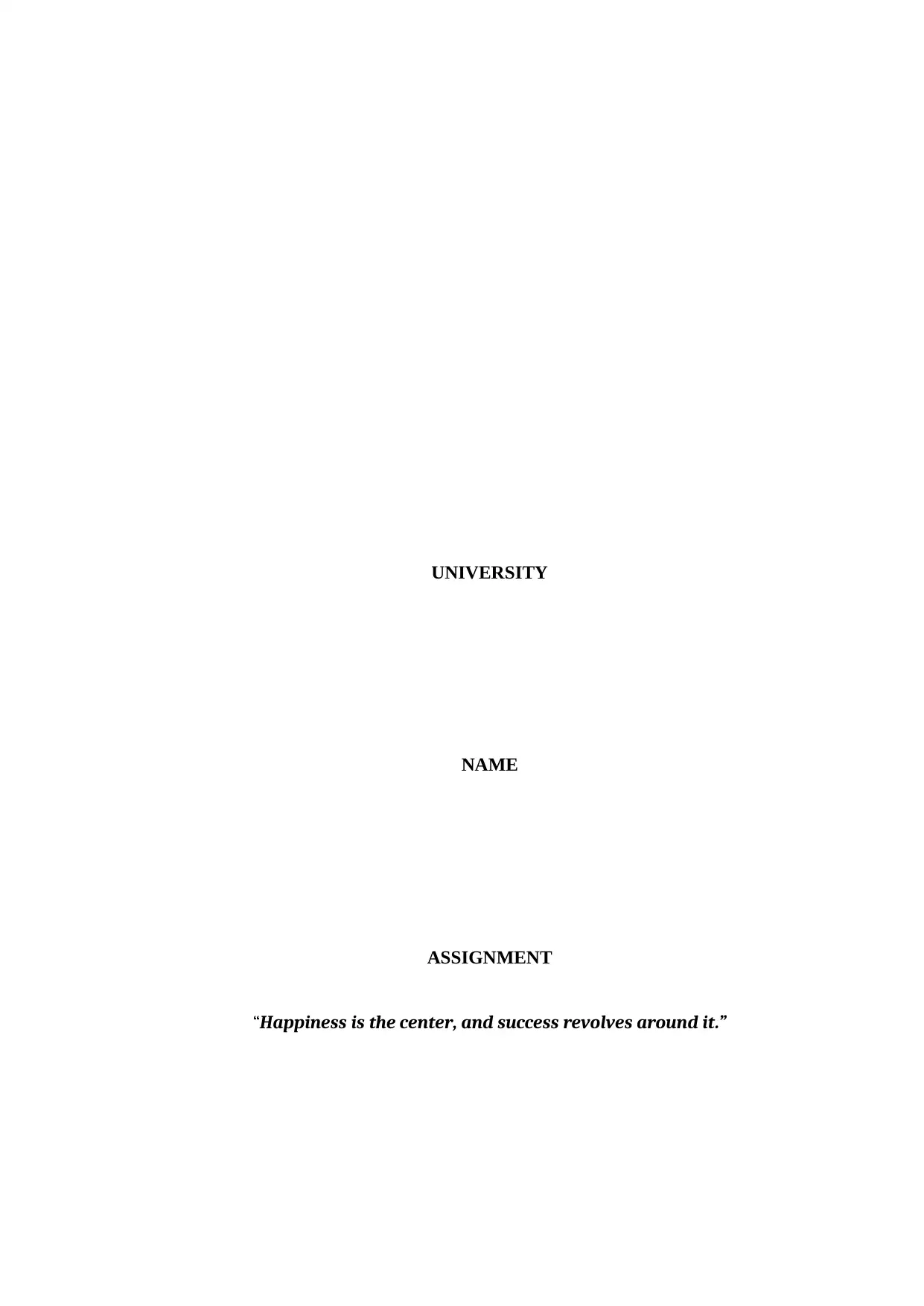
UNIVERSITY
NAME
ASSIGNMENT
“Happiness is the center, and success revolves around it.”
NAME
ASSIGNMENT
“Happiness is the center, and success revolves around it.”
Secure Best Marks with AI Grader
Need help grading? Try our AI Grader for instant feedback on your assignments.
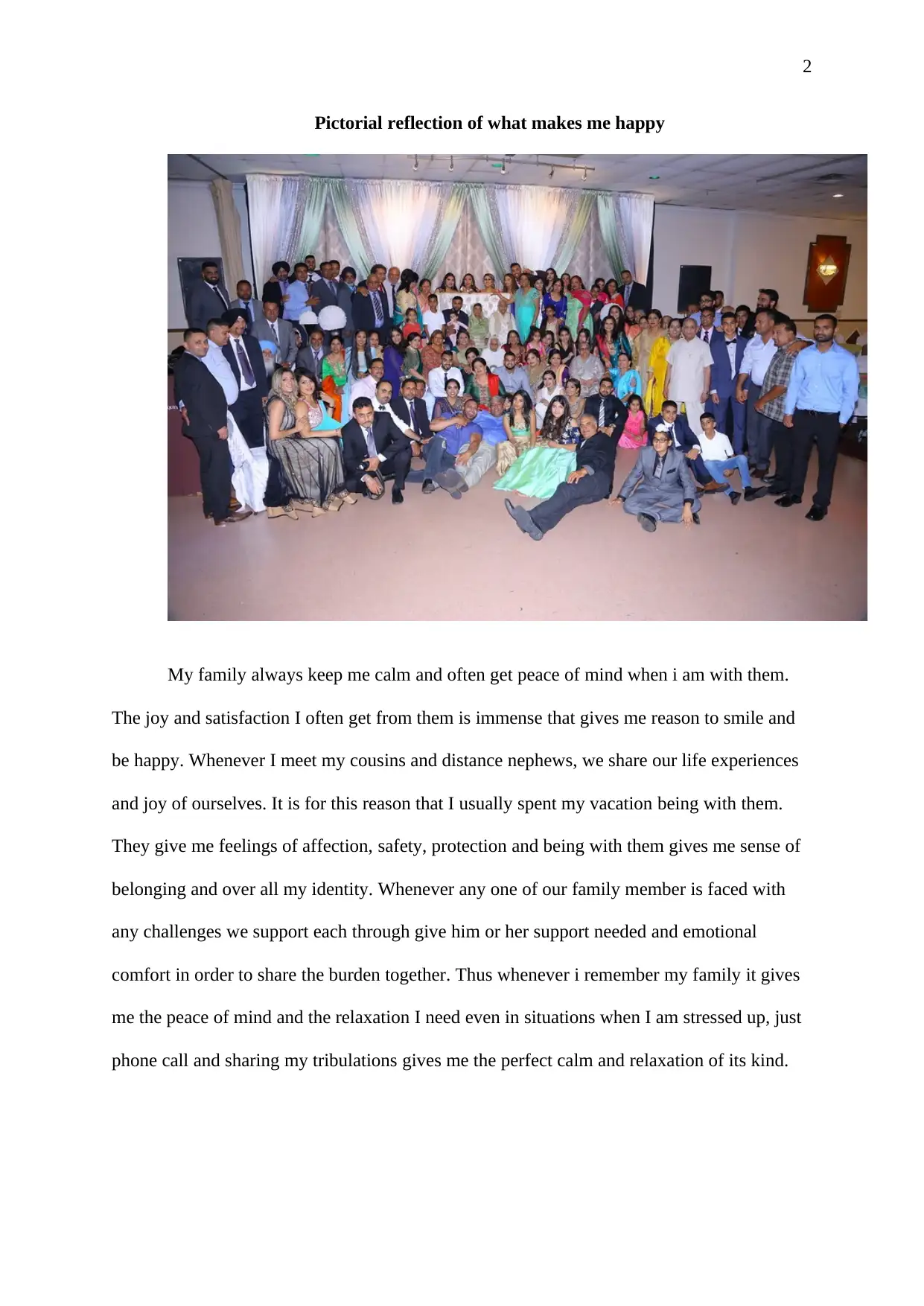
2
Pictorial reflection of what makes me happy
My family always keep me calm and often get peace of mind when i am with them.
The joy and satisfaction I often get from them is immense that gives me reason to smile and
be happy. Whenever I meet my cousins and distance nephews, we share our life experiences
and joy of ourselves. It is for this reason that I usually spent my vacation being with them.
They give me feelings of affection, safety, protection and being with them gives me sense of
belonging and over all my identity. Whenever any one of our family member is faced with
any challenges we support each through give him or her support needed and emotional
comfort in order to share the burden together. Thus whenever i remember my family it gives
me the peace of mind and the relaxation I need even in situations when I am stressed up, just
phone call and sharing my tribulations gives me the perfect calm and relaxation of its kind.
Pictorial reflection of what makes me happy
My family always keep me calm and often get peace of mind when i am with them.
The joy and satisfaction I often get from them is immense that gives me reason to smile and
be happy. Whenever I meet my cousins and distance nephews, we share our life experiences
and joy of ourselves. It is for this reason that I usually spent my vacation being with them.
They give me feelings of affection, safety, protection and being with them gives me sense of
belonging and over all my identity. Whenever any one of our family member is faced with
any challenges we support each through give him or her support needed and emotional
comfort in order to share the burden together. Thus whenever i remember my family it gives
me the peace of mind and the relaxation I need even in situations when I am stressed up, just
phone call and sharing my tribulations gives me the perfect calm and relaxation of its kind.
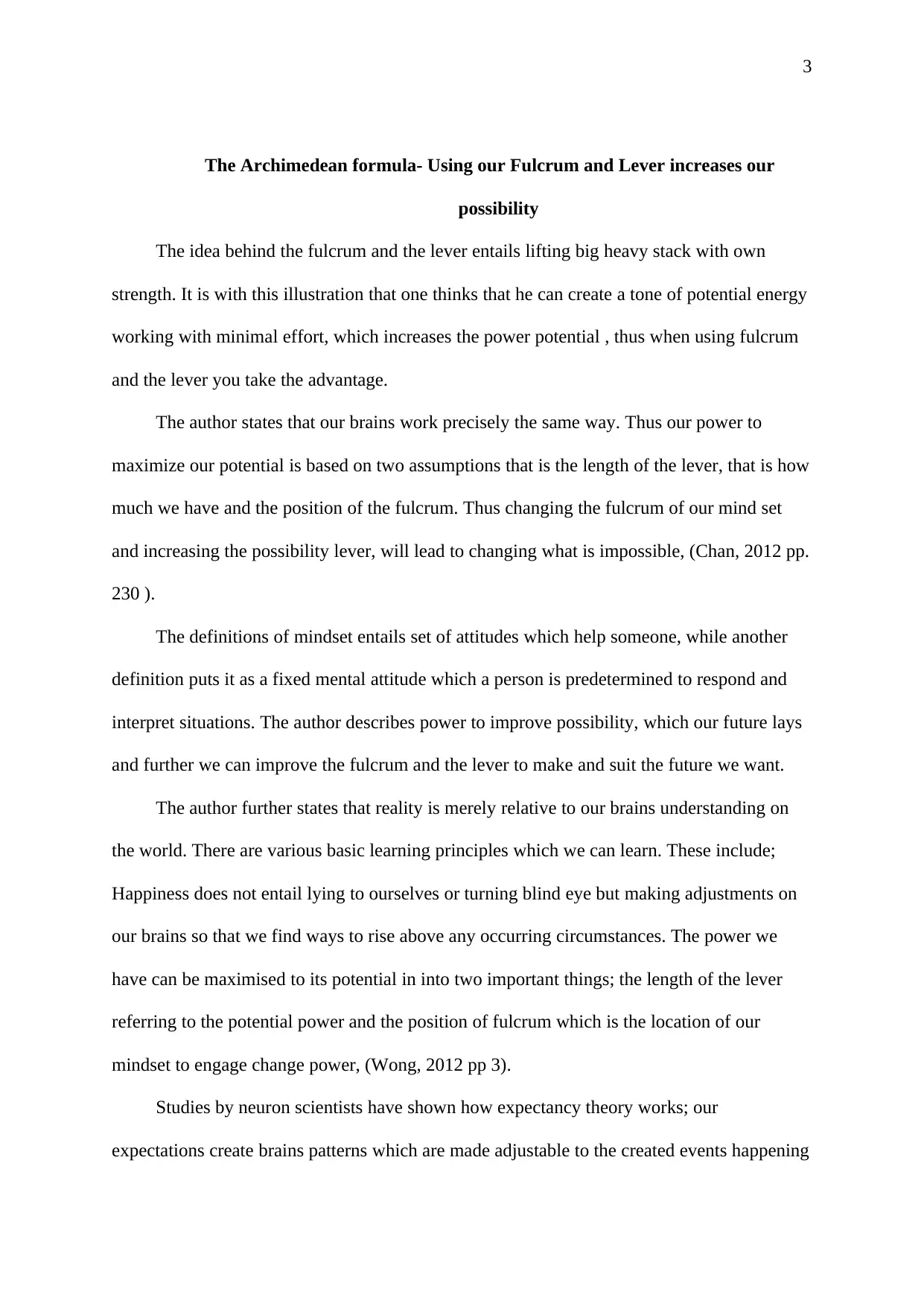
3
The Archimedean formula- Using our Fulcrum and Lever increases our
possibility
The idea behind the fulcrum and the lever entails lifting big heavy stack with own
strength. It is with this illustration that one thinks that he can create a tone of potential energy
working with minimal effort, which increases the power potential , thus when using fulcrum
and the lever you take the advantage.
The author states that our brains work precisely the same way. Thus our power to
maximize our potential is based on two assumptions that is the length of the lever, that is how
much we have and the position of the fulcrum. Thus changing the fulcrum of our mind set
and increasing the possibility lever, will lead to changing what is impossible, (Chan, 2012 pp.
230 ).
The definitions of mindset entails set of attitudes which help someone, while another
definition puts it as a fixed mental attitude which a person is predetermined to respond and
interpret situations. The author describes power to improve possibility, which our future lays
and further we can improve the fulcrum and the lever to make and suit the future we want.
The author further states that reality is merely relative to our brains understanding on
the world. There are various basic learning principles which we can learn. These include;
Happiness does not entail lying to ourselves or turning blind eye but making adjustments on
our brains so that we find ways to rise above any occurring circumstances. The power we
have can be maximised to its potential in into two important things; the length of the lever
referring to the potential power and the position of fulcrum which is the location of our
mindset to engage change power, (Wong, 2012 pp 3).
Studies by neuron scientists have shown how expectancy theory works; our
expectations create brains patterns which are made adjustable to the created events happening
The Archimedean formula- Using our Fulcrum and Lever increases our
possibility
The idea behind the fulcrum and the lever entails lifting big heavy stack with own
strength. It is with this illustration that one thinks that he can create a tone of potential energy
working with minimal effort, which increases the power potential , thus when using fulcrum
and the lever you take the advantage.
The author states that our brains work precisely the same way. Thus our power to
maximize our potential is based on two assumptions that is the length of the lever, that is how
much we have and the position of the fulcrum. Thus changing the fulcrum of our mind set
and increasing the possibility lever, will lead to changing what is impossible, (Chan, 2012 pp.
230 ).
The definitions of mindset entails set of attitudes which help someone, while another
definition puts it as a fixed mental attitude which a person is predetermined to respond and
interpret situations. The author describes power to improve possibility, which our future lays
and further we can improve the fulcrum and the lever to make and suit the future we want.
The author further states that reality is merely relative to our brains understanding on
the world. There are various basic learning principles which we can learn. These include;
Happiness does not entail lying to ourselves or turning blind eye but making adjustments on
our brains so that we find ways to rise above any occurring circumstances. The power we
have can be maximised to its potential in into two important things; the length of the lever
referring to the potential power and the position of fulcrum which is the location of our
mindset to engage change power, (Wong, 2012 pp 3).
Studies by neuron scientists have shown how expectancy theory works; our
expectations create brains patterns which are made adjustable to the created events happening
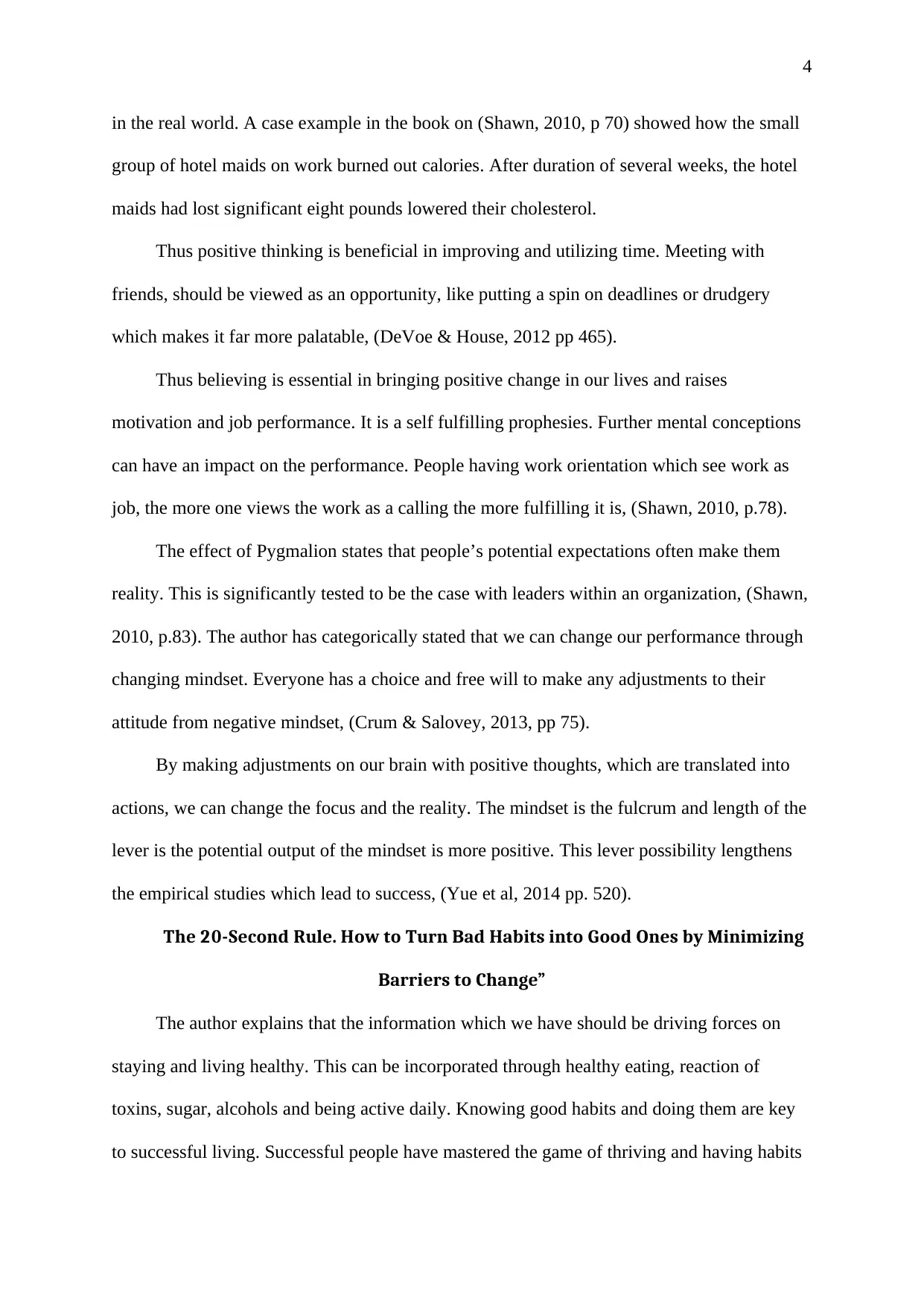
4
in the real world. A case example in the book on (Shawn, 2010, p 70) showed how the small
group of hotel maids on work burned out calories. After duration of several weeks, the hotel
maids had lost significant eight pounds lowered their cholesterol.
Thus positive thinking is beneficial in improving and utilizing time. Meeting with
friends, should be viewed as an opportunity, like putting a spin on deadlines or drudgery
which makes it far more palatable, (DeVoe & House, 2012 pp 465).
Thus believing is essential in bringing positive change in our lives and raises
motivation and job performance. It is a self fulfilling prophesies. Further mental conceptions
can have an impact on the performance. People having work orientation which see work as
job, the more one views the work as a calling the more fulfilling it is, (Shawn, 2010, p.78).
The effect of Pygmalion states that people’s potential expectations often make them
reality. This is significantly tested to be the case with leaders within an organization, (Shawn,
2010, p.83). The author has categorically stated that we can change our performance through
changing mindset. Everyone has a choice and free will to make any adjustments to their
attitude from negative mindset, (Crum & Salovey, 2013, pp 75).
By making adjustments on our brain with positive thoughts, which are translated into
actions, we can change the focus and the reality. The mindset is the fulcrum and length of the
lever is the potential output of the mindset is more positive. This lever possibility lengthens
the empirical studies which lead to success, (Yue et al, 2014 pp. 520).
The 20-Second Rule. How to Turn Bad Habits into Good Ones by Minimizing
Barriers to Change”
The author explains that the information which we have should be driving forces on
staying and living healthy. This can be incorporated through healthy eating, reaction of
toxins, sugar, alcohols and being active daily. Knowing good habits and doing them are key
to successful living. Successful people have mastered the game of thriving and having habits
in the real world. A case example in the book on (Shawn, 2010, p 70) showed how the small
group of hotel maids on work burned out calories. After duration of several weeks, the hotel
maids had lost significant eight pounds lowered their cholesterol.
Thus positive thinking is beneficial in improving and utilizing time. Meeting with
friends, should be viewed as an opportunity, like putting a spin on deadlines or drudgery
which makes it far more palatable, (DeVoe & House, 2012 pp 465).
Thus believing is essential in bringing positive change in our lives and raises
motivation and job performance. It is a self fulfilling prophesies. Further mental conceptions
can have an impact on the performance. People having work orientation which see work as
job, the more one views the work as a calling the more fulfilling it is, (Shawn, 2010, p.78).
The effect of Pygmalion states that people’s potential expectations often make them
reality. This is significantly tested to be the case with leaders within an organization, (Shawn,
2010, p.83). The author has categorically stated that we can change our performance through
changing mindset. Everyone has a choice and free will to make any adjustments to their
attitude from negative mindset, (Crum & Salovey, 2013, pp 75).
By making adjustments on our brain with positive thoughts, which are translated into
actions, we can change the focus and the reality. The mindset is the fulcrum and length of the
lever is the potential output of the mindset is more positive. This lever possibility lengthens
the empirical studies which lead to success, (Yue et al, 2014 pp. 520).
The 20-Second Rule. How to Turn Bad Habits into Good Ones by Minimizing
Barriers to Change”
The author explains that the information which we have should be driving forces on
staying and living healthy. This can be incorporated through healthy eating, reaction of
toxins, sugar, alcohols and being active daily. Knowing good habits and doing them are key
to successful living. Successful people have mastered the game of thriving and having habits
Secure Best Marks with AI Grader
Need help grading? Try our AI Grader for instant feedback on your assignments.
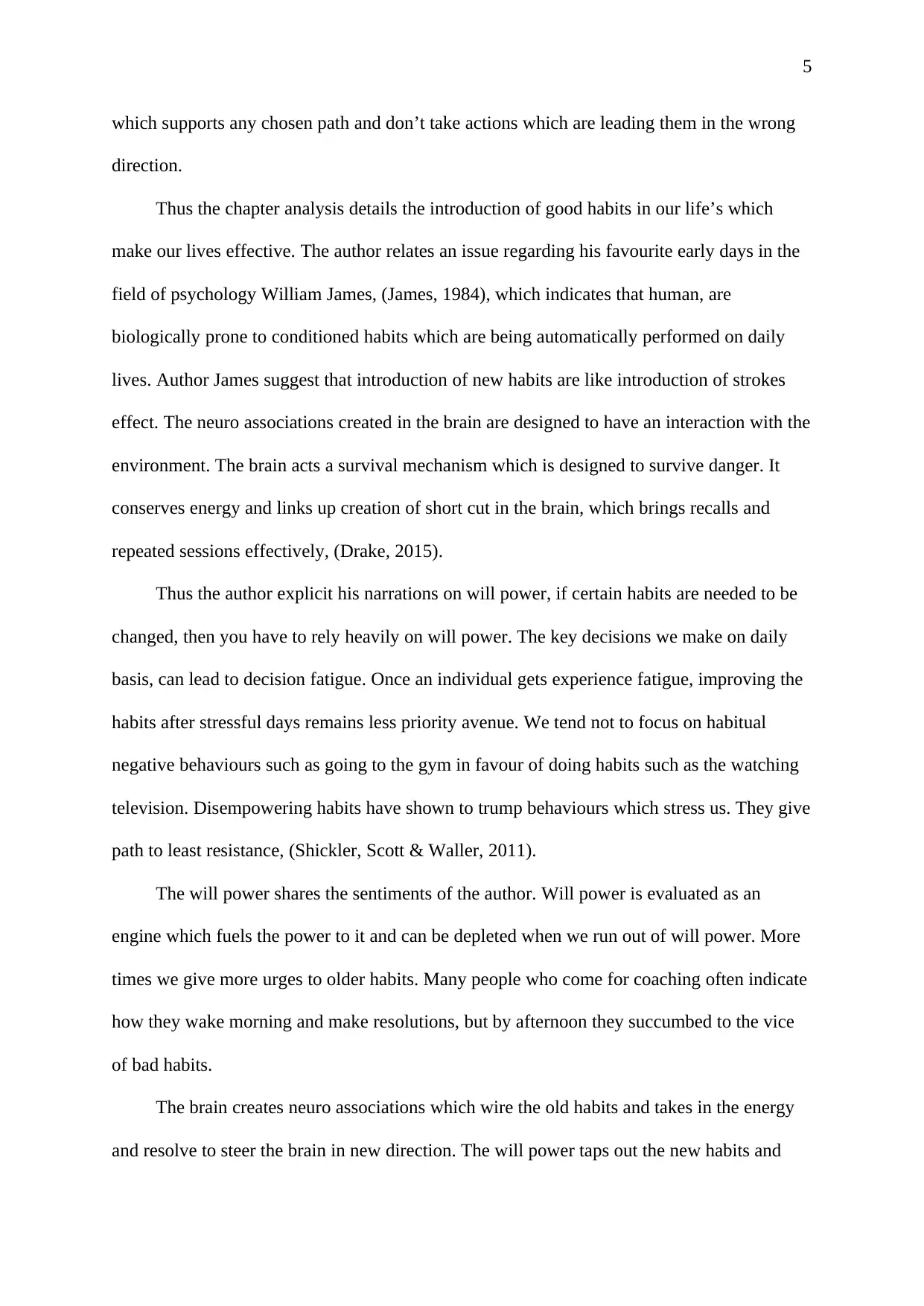
5
which supports any chosen path and don’t take actions which are leading them in the wrong
direction.
Thus the chapter analysis details the introduction of good habits in our life’s which
make our lives effective. The author relates an issue regarding his favourite early days in the
field of psychology William James, (James, 1984), which indicates that human, are
biologically prone to conditioned habits which are being automatically performed on daily
lives. Author James suggest that introduction of new habits are like introduction of strokes
effect. The neuro associations created in the brain are designed to have an interaction with the
environment. The brain acts a survival mechanism which is designed to survive danger. It
conserves energy and links up creation of short cut in the brain, which brings recalls and
repeated sessions effectively, (Drake, 2015).
Thus the author explicit his narrations on will power, if certain habits are needed to be
changed, then you have to rely heavily on will power. The key decisions we make on daily
basis, can lead to decision fatigue. Once an individual gets experience fatigue, improving the
habits after stressful days remains less priority avenue. We tend not to focus on habitual
negative behaviours such as going to the gym in favour of doing habits such as the watching
television. Disempowering habits have shown to trump behaviours which stress us. They give
path to least resistance, (Shickler, Scott & Waller, 2011).
The will power shares the sentiments of the author. Will power is evaluated as an
engine which fuels the power to it and can be depleted when we run out of will power. More
times we give more urges to older habits. Many people who come for coaching often indicate
how they wake morning and make resolutions, but by afternoon they succumbed to the vice
of bad habits.
The brain creates neuro associations which wire the old habits and takes in the energy
and resolve to steer the brain in new direction. The will power taps out the new habits and
which supports any chosen path and don’t take actions which are leading them in the wrong
direction.
Thus the chapter analysis details the introduction of good habits in our life’s which
make our lives effective. The author relates an issue regarding his favourite early days in the
field of psychology William James, (James, 1984), which indicates that human, are
biologically prone to conditioned habits which are being automatically performed on daily
lives. Author James suggest that introduction of new habits are like introduction of strokes
effect. The neuro associations created in the brain are designed to have an interaction with the
environment. The brain acts a survival mechanism which is designed to survive danger. It
conserves energy and links up creation of short cut in the brain, which brings recalls and
repeated sessions effectively, (Drake, 2015).
Thus the author explicit his narrations on will power, if certain habits are needed to be
changed, then you have to rely heavily on will power. The key decisions we make on daily
basis, can lead to decision fatigue. Once an individual gets experience fatigue, improving the
habits after stressful days remains less priority avenue. We tend not to focus on habitual
negative behaviours such as going to the gym in favour of doing habits such as the watching
television. Disempowering habits have shown to trump behaviours which stress us. They give
path to least resistance, (Shickler, Scott & Waller, 2011).
The will power shares the sentiments of the author. Will power is evaluated as an
engine which fuels the power to it and can be depleted when we run out of will power. More
times we give more urges to older habits. Many people who come for coaching often indicate
how they wake morning and make resolutions, but by afternoon they succumbed to the vice
of bad habits.
The brain creates neuro associations which wire the old habits and takes in the energy
and resolve to steer the brain in new direction. The will power taps out the new habits and
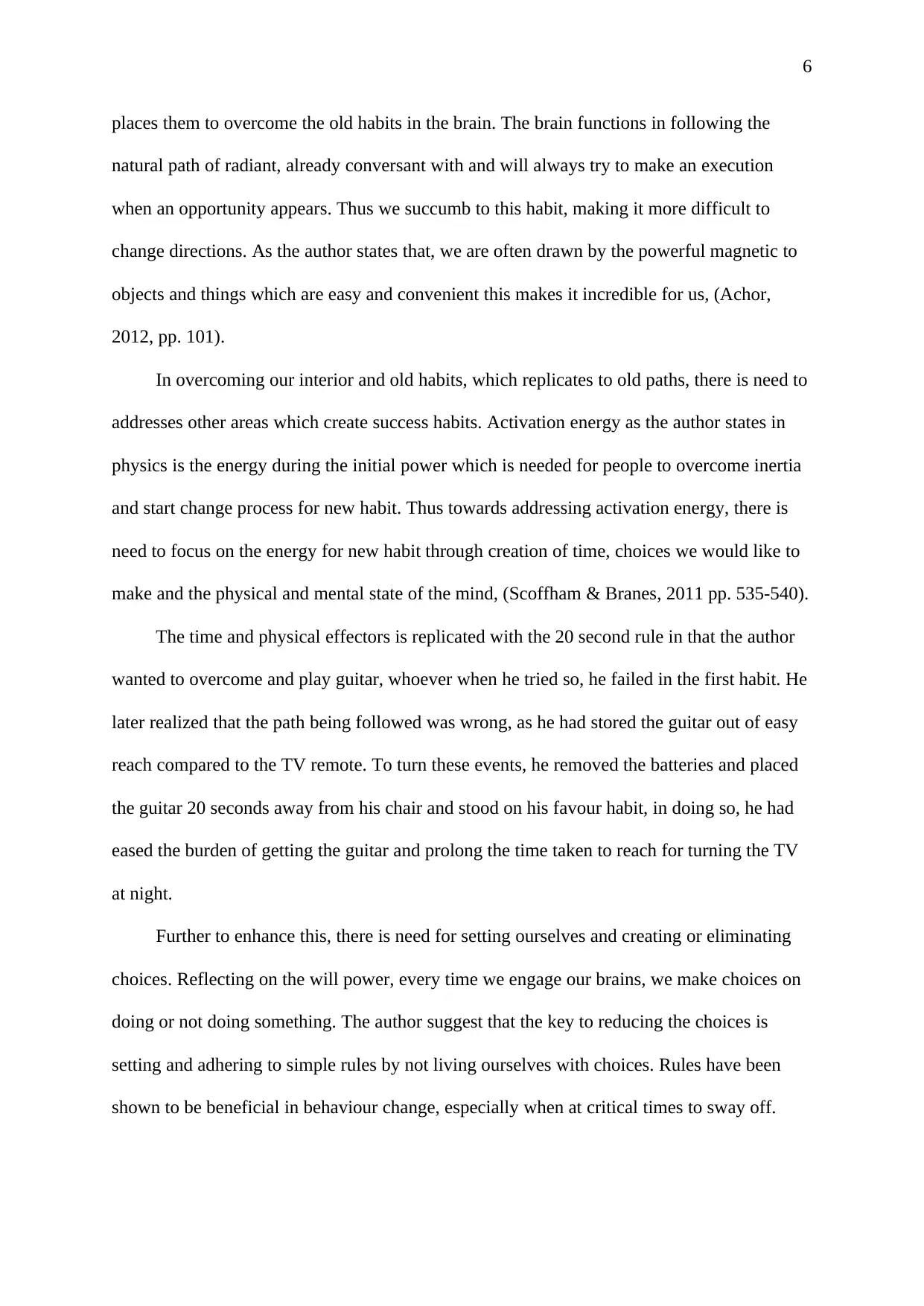
6
places them to overcome the old habits in the brain. The brain functions in following the
natural path of radiant, already conversant with and will always try to make an execution
when an opportunity appears. Thus we succumb to this habit, making it more difficult to
change directions. As the author states that, we are often drawn by the powerful magnetic to
objects and things which are easy and convenient this makes it incredible for us, (Achor,
2012, pp. 101).
In overcoming our interior and old habits, which replicates to old paths, there is need to
addresses other areas which create success habits. Activation energy as the author states in
physics is the energy during the initial power which is needed for people to overcome inertia
and start change process for new habit. Thus towards addressing activation energy, there is
need to focus on the energy for new habit through creation of time, choices we would like to
make and the physical and mental state of the mind, (Scoffham & Branes, 2011 pp. 535-540).
The time and physical effectors is replicated with the 20 second rule in that the author
wanted to overcome and play guitar, whoever when he tried so, he failed in the first habit. He
later realized that the path being followed was wrong, as he had stored the guitar out of easy
reach compared to the TV remote. To turn these events, he removed the batteries and placed
the guitar 20 seconds away from his chair and stood on his favour habit, in doing so, he had
eased the burden of getting the guitar and prolong the time taken to reach for turning the TV
at night.
Further to enhance this, there is need for setting ourselves and creating or eliminating
choices. Reflecting on the will power, every time we engage our brains, we make choices on
doing or not doing something. The author suggest that the key to reducing the choices is
setting and adhering to simple rules by not living ourselves with choices. Rules have been
shown to be beneficial in behaviour change, especially when at critical times to sway off.
places them to overcome the old habits in the brain. The brain functions in following the
natural path of radiant, already conversant with and will always try to make an execution
when an opportunity appears. Thus we succumb to this habit, making it more difficult to
change directions. As the author states that, we are often drawn by the powerful magnetic to
objects and things which are easy and convenient this makes it incredible for us, (Achor,
2012, pp. 101).
In overcoming our interior and old habits, which replicates to old paths, there is need to
addresses other areas which create success habits. Activation energy as the author states in
physics is the energy during the initial power which is needed for people to overcome inertia
and start change process for new habit. Thus towards addressing activation energy, there is
need to focus on the energy for new habit through creation of time, choices we would like to
make and the physical and mental state of the mind, (Scoffham & Branes, 2011 pp. 535-540).
The time and physical effectors is replicated with the 20 second rule in that the author
wanted to overcome and play guitar, whoever when he tried so, he failed in the first habit. He
later realized that the path being followed was wrong, as he had stored the guitar out of easy
reach compared to the TV remote. To turn these events, he removed the batteries and placed
the guitar 20 seconds away from his chair and stood on his favour habit, in doing so, he had
eased the burden of getting the guitar and prolong the time taken to reach for turning the TV
at night.
Further to enhance this, there is need for setting ourselves and creating or eliminating
choices. Reflecting on the will power, every time we engage our brains, we make choices on
doing or not doing something. The author suggest that the key to reducing the choices is
setting and adhering to simple rules by not living ourselves with choices. Rules have been
shown to be beneficial in behaviour change, especially when at critical times to sway off.
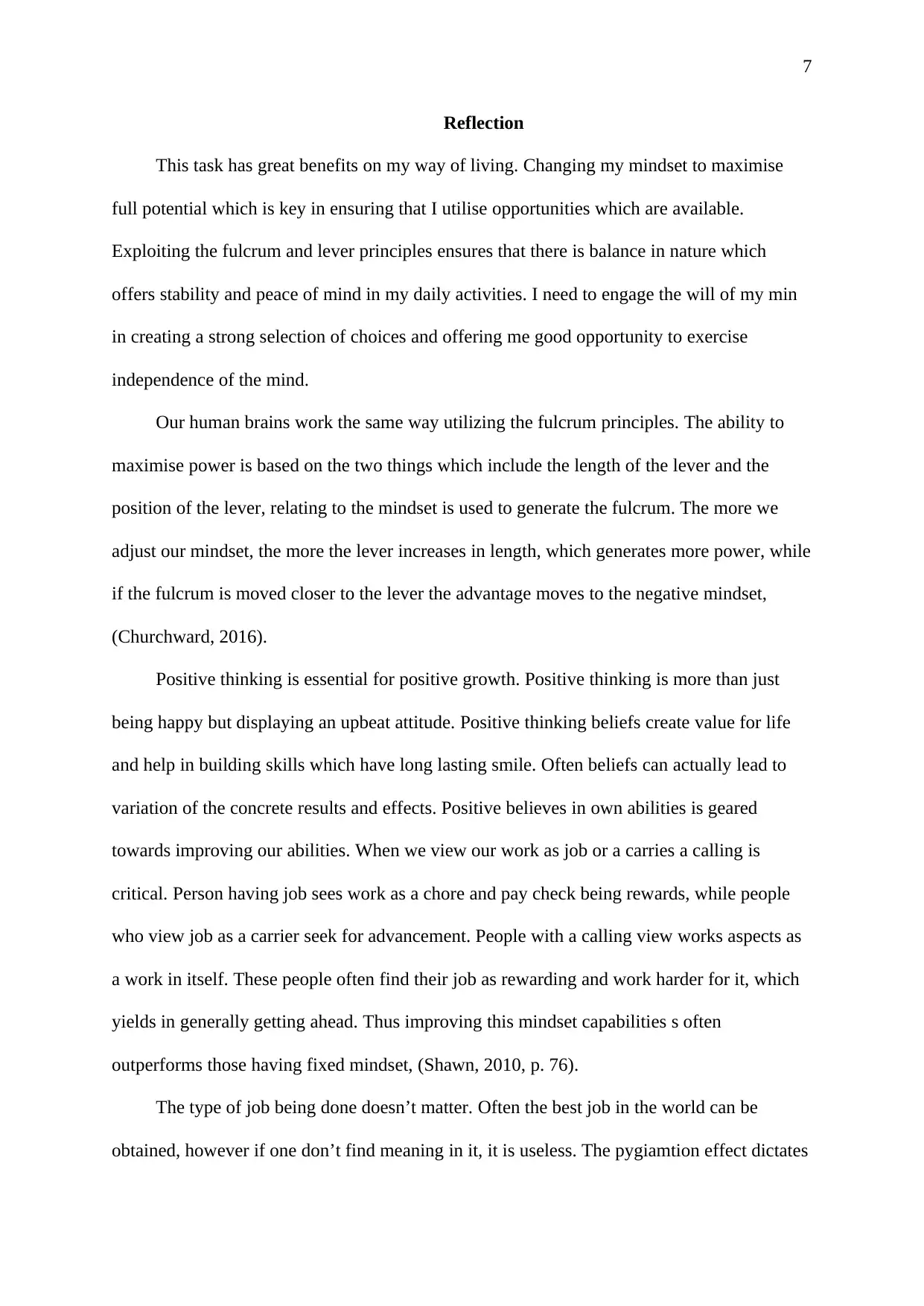
7
Reflection
This task has great benefits on my way of living. Changing my mindset to maximise
full potential which is key in ensuring that I utilise opportunities which are available.
Exploiting the fulcrum and lever principles ensures that there is balance in nature which
offers stability and peace of mind in my daily activities. I need to engage the will of my min
in creating a strong selection of choices and offering me good opportunity to exercise
independence of the mind.
Our human brains work the same way utilizing the fulcrum principles. The ability to
maximise power is based on the two things which include the length of the lever and the
position of the lever, relating to the mindset is used to generate the fulcrum. The more we
adjust our mindset, the more the lever increases in length, which generates more power, while
if the fulcrum is moved closer to the lever the advantage moves to the negative mindset,
(Churchward, 2016).
Positive thinking is essential for positive growth. Positive thinking is more than just
being happy but displaying an upbeat attitude. Positive thinking beliefs create value for life
and help in building skills which have long lasting smile. Often beliefs can actually lead to
variation of the concrete results and effects. Positive believes in own abilities is geared
towards improving our abilities. When we view our work as job or a carries a calling is
critical. Person having job sees work as a chore and pay check being rewards, while people
who view job as a carrier seek for advancement. People with a calling view works aspects as
a work in itself. These people often find their job as rewarding and work harder for it, which
yields in generally getting ahead. Thus improving this mindset capabilities s often
outperforms those having fixed mindset, (Shawn, 2010, p. 76).
The type of job being done doesn’t matter. Often the best job in the world can be
obtained, however if one don’t find meaning in it, it is useless. The pygiamtion effect dictates
Reflection
This task has great benefits on my way of living. Changing my mindset to maximise
full potential which is key in ensuring that I utilise opportunities which are available.
Exploiting the fulcrum and lever principles ensures that there is balance in nature which
offers stability and peace of mind in my daily activities. I need to engage the will of my min
in creating a strong selection of choices and offering me good opportunity to exercise
independence of the mind.
Our human brains work the same way utilizing the fulcrum principles. The ability to
maximise power is based on the two things which include the length of the lever and the
position of the lever, relating to the mindset is used to generate the fulcrum. The more we
adjust our mindset, the more the lever increases in length, which generates more power, while
if the fulcrum is moved closer to the lever the advantage moves to the negative mindset,
(Churchward, 2016).
Positive thinking is essential for positive growth. Positive thinking is more than just
being happy but displaying an upbeat attitude. Positive thinking beliefs create value for life
and help in building skills which have long lasting smile. Often beliefs can actually lead to
variation of the concrete results and effects. Positive believes in own abilities is geared
towards improving our abilities. When we view our work as job or a carries a calling is
critical. Person having job sees work as a chore and pay check being rewards, while people
who view job as a carrier seek for advancement. People with a calling view works aspects as
a work in itself. These people often find their job as rewarding and work harder for it, which
yields in generally getting ahead. Thus improving this mindset capabilities s often
outperforms those having fixed mindset, (Shawn, 2010, p. 76).
The type of job being done doesn’t matter. Often the best job in the world can be
obtained, however if one don’t find meaning in it, it is useless. The pygiamtion effect dictates
Paraphrase This Document
Need a fresh take? Get an instant paraphrase of this document with our AI Paraphraser
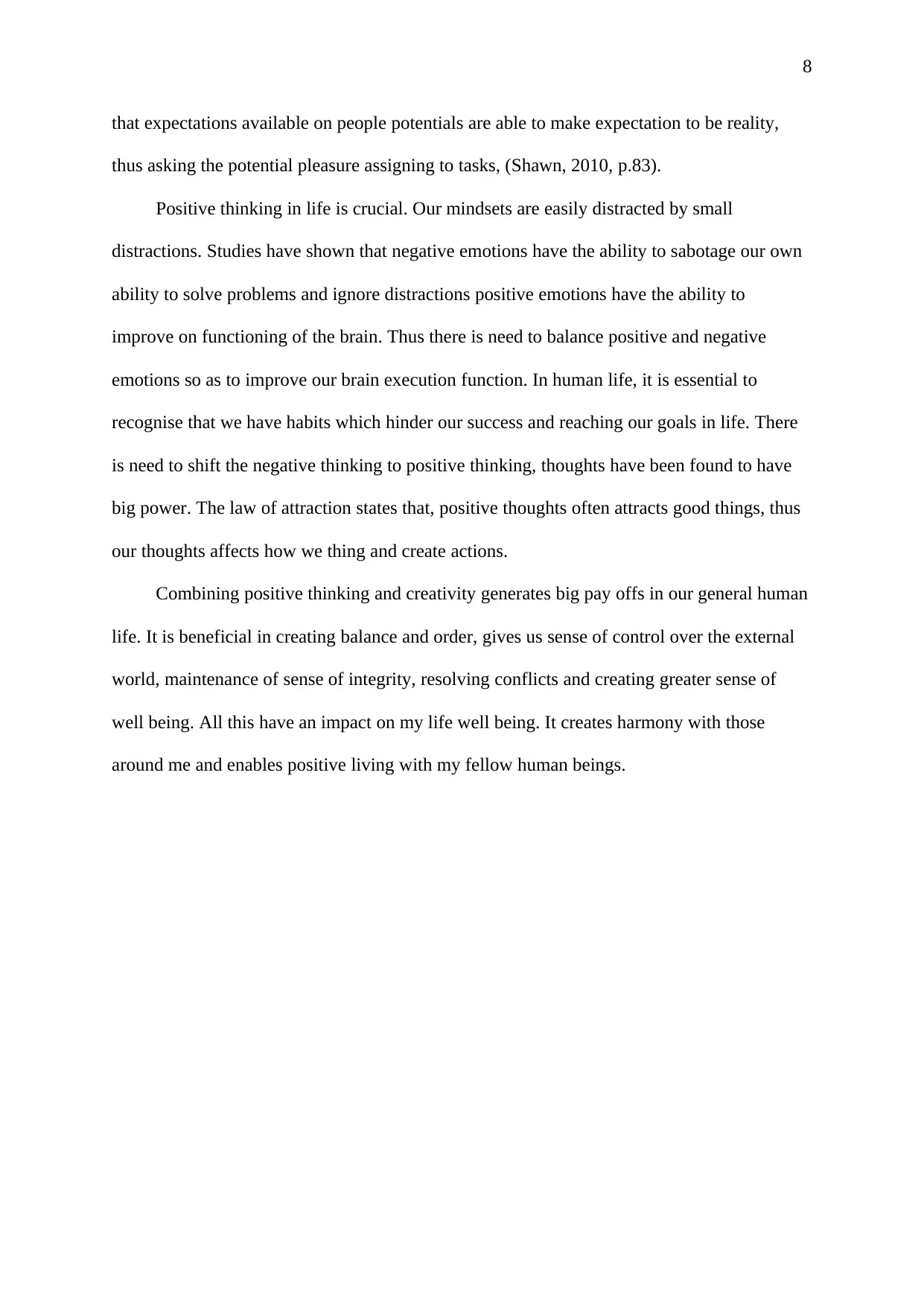
8
that expectations available on people potentials are able to make expectation to be reality,
thus asking the potential pleasure assigning to tasks, (Shawn, 2010, p.83).
Positive thinking in life is crucial. Our mindsets are easily distracted by small
distractions. Studies have shown that negative emotions have the ability to sabotage our own
ability to solve problems and ignore distractions positive emotions have the ability to
improve on functioning of the brain. Thus there is need to balance positive and negative
emotions so as to improve our brain execution function. In human life, it is essential to
recognise that we have habits which hinder our success and reaching our goals in life. There
is need to shift the negative thinking to positive thinking, thoughts have been found to have
big power. The law of attraction states that, positive thoughts often attracts good things, thus
our thoughts affects how we thing and create actions.
Combining positive thinking and creativity generates big pay offs in our general human
life. It is beneficial in creating balance and order, gives us sense of control over the external
world, maintenance of sense of integrity, resolving conflicts and creating greater sense of
well being. All this have an impact on my life well being. It creates harmony with those
around me and enables positive living with my fellow human beings.
that expectations available on people potentials are able to make expectation to be reality,
thus asking the potential pleasure assigning to tasks, (Shawn, 2010, p.83).
Positive thinking in life is crucial. Our mindsets are easily distracted by small
distractions. Studies have shown that negative emotions have the ability to sabotage our own
ability to solve problems and ignore distractions positive emotions have the ability to
improve on functioning of the brain. Thus there is need to balance positive and negative
emotions so as to improve our brain execution function. In human life, it is essential to
recognise that we have habits which hinder our success and reaching our goals in life. There
is need to shift the negative thinking to positive thinking, thoughts have been found to have
big power. The law of attraction states that, positive thoughts often attracts good things, thus
our thoughts affects how we thing and create actions.
Combining positive thinking and creativity generates big pay offs in our general human
life. It is beneficial in creating balance and order, gives us sense of control over the external
world, maintenance of sense of integrity, resolving conflicts and creating greater sense of
well being. All this have an impact on my life well being. It creates harmony with those
around me and enables positive living with my fellow human beings.
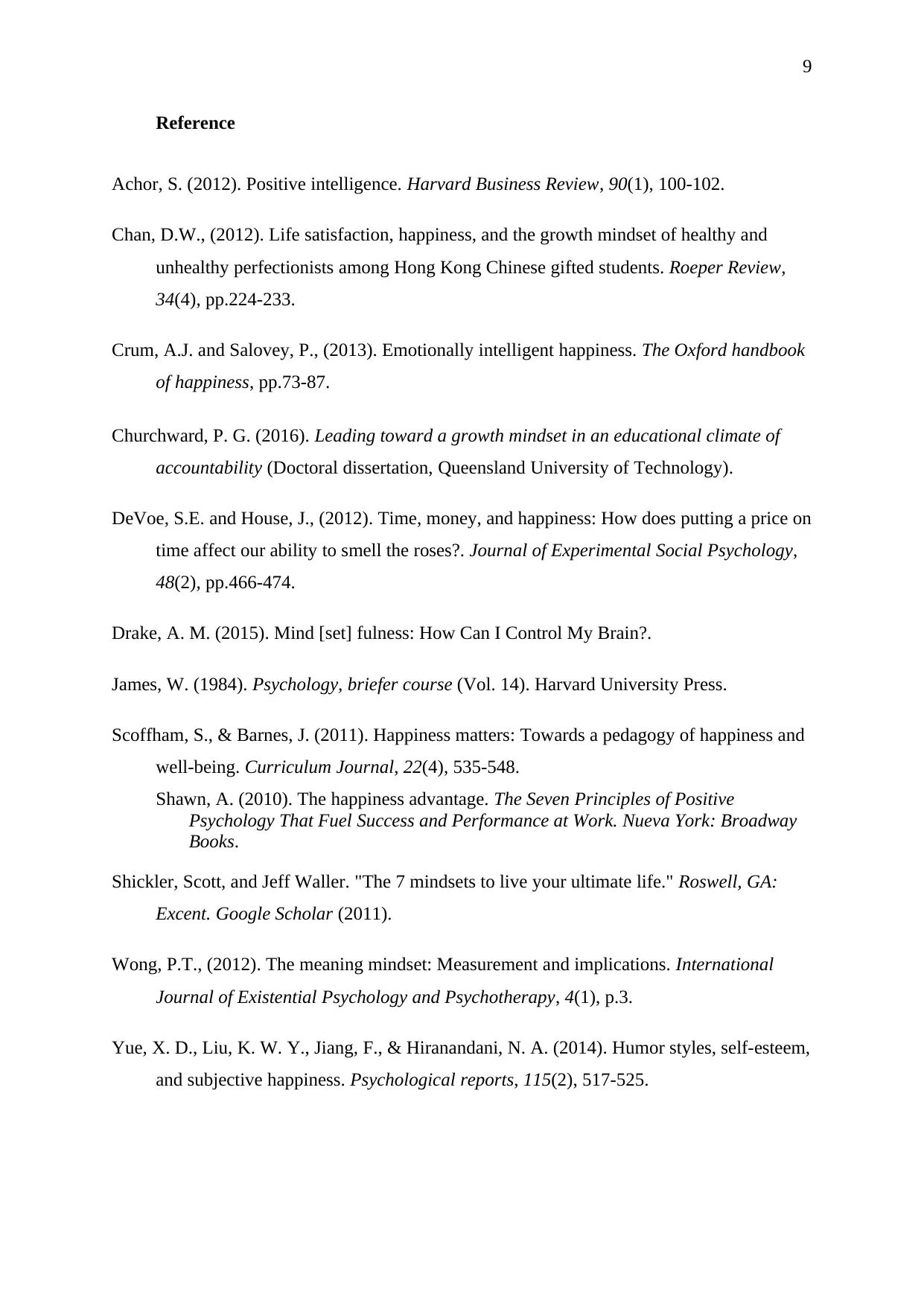
9
Reference
Achor, S. (2012). Positive intelligence. Harvard Business Review, 90(1), 100-102.
Chan, D.W., (2012). Life satisfaction, happiness, and the growth mindset of healthy and
unhealthy perfectionists among Hong Kong Chinese gifted students. Roeper Review,
34(4), pp.224-233.
Crum, A.J. and Salovey, P., (2013). Emotionally intelligent happiness. The Oxford handbook
of happiness, pp.73-87.
Churchward, P. G. (2016). Leading toward a growth mindset in an educational climate of
accountability (Doctoral dissertation, Queensland University of Technology).
DeVoe, S.E. and House, J., (2012). Time, money, and happiness: How does putting a price on
time affect our ability to smell the roses?. Journal of Experimental Social Psychology,
48(2), pp.466-474.
Drake, A. M. (2015). Mind [set] fulness: How Can I Control My Brain?.
James, W. (1984). Psychology, briefer course (Vol. 14). Harvard University Press.
Scoffham, S., & Barnes, J. (2011). Happiness matters: Towards a pedagogy of happiness and
well-being. Curriculum Journal, 22(4), 535-548.
Shawn, A. (2010). The happiness advantage. The Seven Principles of Positive
Psychology That Fuel Success and Performance at Work. Nueva York: Broadway
Books.
Shickler, Scott, and Jeff Waller. "The 7 mindsets to live your ultimate life." Roswell, GA:
Excent. Google Scholar (2011).
Wong, P.T., (2012). The meaning mindset: Measurement and implications. International
Journal of Existential Psychology and Psychotherapy, 4(1), p.3.
Yue, X. D., Liu, K. W. Y., Jiang, F., & Hiranandani, N. A. (2014). Humor styles, self-esteem,
and subjective happiness. Psychological reports, 115(2), 517-525.
Reference
Achor, S. (2012). Positive intelligence. Harvard Business Review, 90(1), 100-102.
Chan, D.W., (2012). Life satisfaction, happiness, and the growth mindset of healthy and
unhealthy perfectionists among Hong Kong Chinese gifted students. Roeper Review,
34(4), pp.224-233.
Crum, A.J. and Salovey, P., (2013). Emotionally intelligent happiness. The Oxford handbook
of happiness, pp.73-87.
Churchward, P. G. (2016). Leading toward a growth mindset in an educational climate of
accountability (Doctoral dissertation, Queensland University of Technology).
DeVoe, S.E. and House, J., (2012). Time, money, and happiness: How does putting a price on
time affect our ability to smell the roses?. Journal of Experimental Social Psychology,
48(2), pp.466-474.
Drake, A. M. (2015). Mind [set] fulness: How Can I Control My Brain?.
James, W. (1984). Psychology, briefer course (Vol. 14). Harvard University Press.
Scoffham, S., & Barnes, J. (2011). Happiness matters: Towards a pedagogy of happiness and
well-being. Curriculum Journal, 22(4), 535-548.
Shawn, A. (2010). The happiness advantage. The Seven Principles of Positive
Psychology That Fuel Success and Performance at Work. Nueva York: Broadway
Books.
Shickler, Scott, and Jeff Waller. "The 7 mindsets to live your ultimate life." Roswell, GA:
Excent. Google Scholar (2011).
Wong, P.T., (2012). The meaning mindset: Measurement and implications. International
Journal of Existential Psychology and Psychotherapy, 4(1), p.3.
Yue, X. D., Liu, K. W. Y., Jiang, F., & Hiranandani, N. A. (2014). Humor styles, self-esteem,
and subjective happiness. Psychological reports, 115(2), 517-525.
1 out of 9
Related Documents
Your All-in-One AI-Powered Toolkit for Academic Success.
+13062052269
info@desklib.com
Available 24*7 on WhatsApp / Email
![[object Object]](/_next/static/media/star-bottom.7253800d.svg)
Unlock your academic potential
© 2024 | Zucol Services PVT LTD | All rights reserved.
